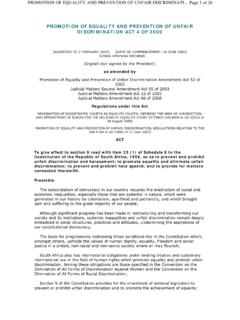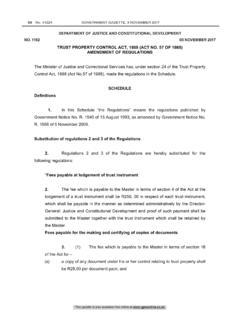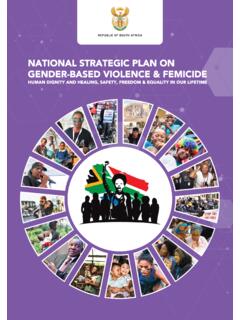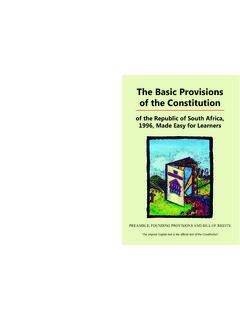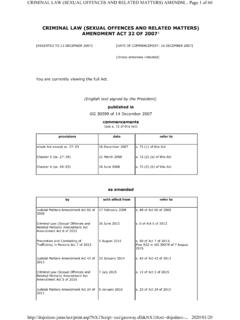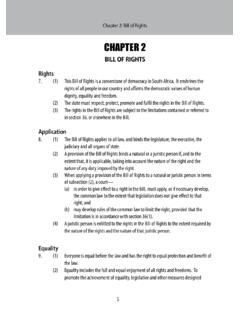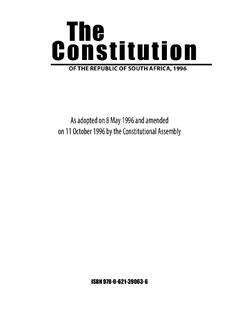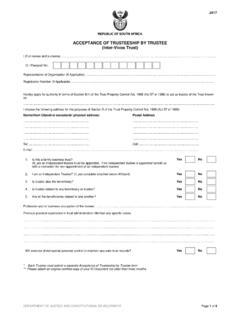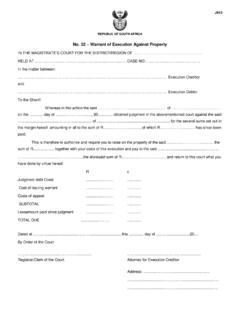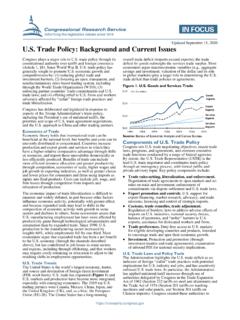Transcription of English What does the South African Constitution say about ...
1 What does the South AfricanConstitution say about your Human Rights?EnglishThe Constitution of the Republic of South Africa, 1996 Human rights are the rights everyone does the South African Constitution say about your Human Rights?This booklet was last updated in February TO HUMAN RIGHTS .. 4 THE RIGHT TO EQUALITY (SECTION 9) .. 6 THE RIGHT TO HUMAN DIGNITY (SECTION 10) .. 9 THE RIGHT TO LIFE (SECTION 11) ..9 THE RIGHT TO FREEDOM AND SECURITY OF THE PERSON (SECTION 12) .. 9 THE RIGHT AGAINST SLAVERY, SERVITUDE AND FORCED LABOUR (SECTION 13).. 10 THE RIGHT TO PRIVACY (SECTION 14) .. 10 THE RIGHT TO FREEDOM OF RELIGION, BELIEF AND OPINION (SECTION 15) .. 11 THE RIGHT TO FREEDOM OF EXPRESSION (SECTION 16).. 11 THE RIGHT TO ASSEMBLY, DEMONSTRATION, PICKET AND PETITION (SECTION 17).
2 12 THE RIGHT TO FREEDOM OF ASSOCIATION (SECTION 18) .. 12 POLITICAL RIGHTS (SECTION 19) .. 13 THE RIGHT NOT TO BE DEPRIVED OF CITIZENSHIP (SECTION 20) .. 13 THE RIGHT TO FREEDOM OF MOVEMENT AND RESIDENCE (SECTION 21) .. 14 THE RIGHT TO FREEDOM OF TRADE, OCCUPATION AND PROFESSION (SECTION 22) .. 14 WORKERS AND EMPLOYERS RIGHTS (LABOUR RELATIONS) (SECTION 23) .. 14 Table of contents3 ENVIRONMENTAL RIGHTS (SECTION 24) .. 15 PROPERTY RIGHTS (SECTION 25) .. 16 THE RIGHT OF ACCESS TO HOUSING (SECTION 26).. 17 THE RIGHT OF ACCESS TO HEALTHCARE, FOOD, WATER ANDSOCIAL SECURITY (SECTION 27) .. 18 THE RIGHTS OF CHILDREN (SECTION 28) .. 19 THE RIGHT TO EDUCATION (SECTION 29) .. 21 THE RIGHT TO LANGUAGE AND CULTURE (SECTION 30) .. 22 THE RIGHTS OF CULTURAL, RELIGIOUS AND LINGUISTIC COMMUNITIES (SECTION 31).
3 22 THE RIGHT OF ACCESS TO INFORMATION (SECTION 32) .. 23 THE RIGHT TO JUST ADMINISTRATIVE ACTION (SECTION 33) .. 23 THE RIGHT OF ACCESS TO COURTS (SECTION 34) .. 24 THE RIGHTS OF ARRESTED, DETAINED AND ACCUSED PERSONS (SECTION 35) .. 24 THE LIMITATION OF RIGHTS (SECTION 36) .. 26 CONCLUSION .. 284 KNOW YOUR HUMAN RIGHTSINTRODUCTIONThe Constitution of the Republic of South Africa is the highest law of the land and any law or conduct that is in conflict with it is invalid. According to the Constitution , South Africa is one, sovereign, democratic state founded on the following values: human dignity, the achievement of equality and the advancement of human rights and freedoms. The obligations flowing from the Constitution must be followed and respected by every person in South Africa.
4 It is the guiding document for all our laws, and the foundation for lasting freedom and democracy. Our Constitution was adopted by Parliament on 8 May 1996, signed into law by the first President of a free and democratic South Africa, Mr Nelson Mandela, in Sharpeville on 10 December the Constitution making process, the people across the length and breadth of South Africa were invited to make submissions on what should be reflected in the Constitution . This was a unique, exciting and vibrant process where people were given an opportunity to have their say. The purpose of the Constitution is to: heal the divisions of the past and establish a society based on democratic values, social justice and fundamental human rights; lay the foundations for a democratic and open society in which government is based on the will of the people and every citizen is equally protected by law; improve the quality of life of all citizens and free the potential of each person; and build a united and democratic South Africa able to take its rightful place as a sovereign state in the family of 2 of the Constitution contains the Bill of Rights which protects our human rights.
5 The Bill of Rights is the cornerstone of our democracy. It enshrines the rights of all people in our country and affirms the democratic values of human dignity, equality and freedom. Whilst every person is entitled to these rights, they also have a responsibility to respect these rights. The Government has a duty to respect, protect, promote and fulfil the rights in the Bill of Rights. The rights in the Bill of Rights are explained in the following paragraphs in the light of the rulings of the Constitutional Court, useful information from the Constitutional Court website and other relevant are these human rights?People say they are in the s right!Human rights are the rights everyone simply because they are human beings!They are the basic rights the government must protect!
6 Such as?Such as the right to life!The right to say what you believe!The right to be treated equally!Great!But if we already have do they have to be in the Constitution ?To protect them!It makes them part of the highest so you can use them in court to protect because it s very hard to change the it s also very hard for anyone to take your human rights away!Let them just try!6 THE RIGHT TO EQUALITY (SECTION 9) Everyone is equal before the law and has the right to equal protection and benefit of the law. Every person is therefore entitled to equal treatment by our courts. No one is above the law and all persons are impartially subject to the law. However, the conduct of the law or government (the executive) that differentiates between people or categories of people may be justified if it reasonably serves a legitimate government INFORMATION In order to promote the achievement of equality, the State is empowered to make laws and take measures aimed at protecting or advancing persons, or categories of persons, disadvantaged by unfair discrimination (those that are disadvantaged as a result of apartheid laws).
7 For example affirmative action is one such measure. The Employment Equity Act 55 of 1998 seeks to, amongst others, ensure the implementation of employment equity in the workplace to redress the effects of discrimination, and achieve a diverse workforce broadly representative of the people of South Africa. No person, including the State, may unfairly discriminate against anyone on the basis of race, gender, sex, pregnancy, marital status, ethnic or social origin, colour, sexual orientation, age, disability, religion, conscience, belief, culture, language and birth. This is not a closed list of grounds. Any action that treats persons differently in a way that impairs their fundamental dignity as human beings or that affects persons negatively in a comparably serious manner may amount to unfair discrimination.
8 For instance, no person may unfairly discriminate against any person because of his or her HIV status. People who are living with HIV and AIDS must be treated with compassion and understanding and be shown ubuntu, and they must not be denied equal opportunities in as I say, !Oh no, you won t - not any more!Billof Rights7 Parliament passed a law to promote equality and prevent unfair discrimination. The law is called the Promotion of Equality and Prevention of unfair Discrimination Act 4 of 2000. The Act seeks, amongst others, to: - promote equality; - prohibit and prevent unfair discrimination; - prevent and prohibit hate speech; - prevent harrassment; - establish equality courts so that any person who feels he or she is being unfairly discriminated against may approach these courts; and - provide remedies for victims of unfair discrimination, hate speech and harassment and persons whose right to equality has been infringed upon.
9 USEFUL INFORMATIONThe Department of Justice and Constitutional Development has established equality courts to deal with complaints on unfair discrimination, hate speech and ARE EQUALITY COURTS AND WHERE TO FIND THEM?Equality courts are specialised courts designated to hear matters relating to unfair discrimination, hate speech and harassment. In terms of the Act all High Courts are equality courts for their area of Department of Justice and Constitutional Development has designated all magistrates courts to serve as equality courts in all the 9 provinces. Although the equality court is a formal court sitting, the rules and procedures are more relaxed than in normal courts the court room itself is usually not as intimidating as an ordinary court, the proceedings are held in a room that is arranged in boardroom style where the complainant and the respondent sit on either side.
10 Normal rules of the magistrates court apply but the presiding officer does not apply them in a rigid manner when conducting the proceedings. 8 WHO CAN INSTITUTE PROCEEDINGS AT THE EQUALITY COURT?In order to institute proceedings in the equality court it is not a requirement that one must have legal representation. Proceedings in the equality court may be instituted by: any person acting in his/her own interests; any person acting on behalf of another person who cannot act in his/her own name; any person acting as a member of, or in the interests of a group or class of persons; any person acting in the interest of the public; any association or organization or body acting in the interests of its members; or the South African Human Rights Commission or the Commission on Gender Act places specific duties on the South African Human Rights Commission, the Commission on Gender Equality and other bodies that have been set up in terms of the Constitution .
